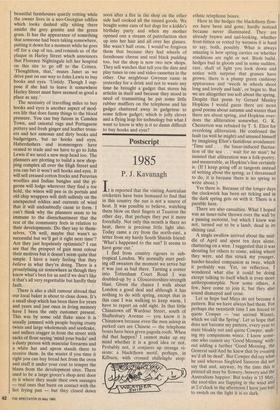Postscript
1985
P. J. Kavanagh It is reported that the visiting Australian cricketers have been bemused to find that in this country the sun is not a source of heat. It was possible to believe, watching them blow on their fingers at Taunton the other day, that perhaps they put it more forcefully. Not only this month is there no heat, there is precious little light also. Today came a cry from the north-east, a letter from my hardy South Shields friend: 'What's happened to the sun? It seems to have gone out.'
I fled from country rigours to sub- tropical London. We normally start peel- ing off sweaters the moment we arrive but it was just as bad there. Turning a corner into Tottenham Court Road I was doubled-up by a Gloucestershire-strength blast. Given the chance I walk about London a good deal and although it has nothing to do with spring, except that in this case I was walking to keep warm, I have to report an odd sight. In that little Chinatown off Wardour Street, south of Shaftesbury Avenue — you know it is Chinatown because even the men asleep in parked cars are Chinese — the telephone boxes have been given pagoda roofs. When did that happen? I cannot make up my mind whether it is a good idea or not. Probably not, it conjures up strange vi- sions: a blackthorn motif, perhaps, in Kilburn, with crossed shillelaghs atop: ethnic telephone boxes.
Here in the hedges the blackthorn flow- ers have been and gone, hardly noticed because never illuminated. They are already brown and sad-looking, whether frost-bitten or rotted by wetness it is hard to say; both, possibly. What is always amazing is how spring carries on whether conditions are right or not. Birds build, hedges bud in gloom and in some sudden, rare, shaft of light you look down and notice with surprise that grasses have grown, there is a plump green cushiony appearance and 'weeds in wheels shoot long and lovely and lush', or begin to. But we are altogether too soft about the spring. Despite that poem by Gerard Manley Hopkins I would guess there are more good poems about autumn and winter than there are about spring, and Hopkins over- does the alliteration somewhat. G. K. Chesterton was rebuked by T. S. Eliot for overdoing alliteration. He confessed the fault (as well he might) and amused himself by imagining Eliot's fastidious avoidances: 'Time and . . . the lunar-induced fluctua- tion of the sea . . . wait for no man'; he insisted that alliteration was a folk-poetry, and memorable, as Hopkins's line certainly is. (If I keep going off at tangents instead of writing about the spring, as I threatened to do, it is because there is no spring to write about.) Yes there is. Because of the longer days the clockwork has been set ticking and in the dark spring gets on with it. There is a parable here.
There are also casualties. What I hoped was an inner-tube thrown over the wall by a passing motorist, but which I knew was not, turned out to be a lamb, dead in its shining caul.
A single swallow arrived about the mid- dle of April and spent ten days alone, chattering on a wire. I suggested that it was shouting for others to come, asking where they were, and this struck my younger, harder-headed companion as twee, which it probably was. Yet, on reflection, I wondered what else it could be doing except talking to itself which is even more anthropomorphic. Now some others, a few, have come to join it, but they also sound dismayed and cross.
Let us hope bad Mays do not become a pattern. But we have always had them. For perhaps the twentieth time I am forced to quote Cowper — 'our second Winter, which we call the Spring'. Let us hope that does not become my pattern, every year to stare bleakly out and quote Cowper, mak- ing my companions wince. I know some- one who cannot say 'Good Morning' with- out adding a further 'Good Morning, the General said/And he knew that by evening we'd all be dead'. But Cowper did say what he said whereas Siegfried Sassoon did not say that and, anyway, by the time this is printed all may be flowery, bowery and the Australians happier. But today is 15 MaY, the roof-tiles are flapping in the wind and at 2 o'clock in the afternoon I have just had to switch on the light it is so dark.


















































 Previous page
Previous page